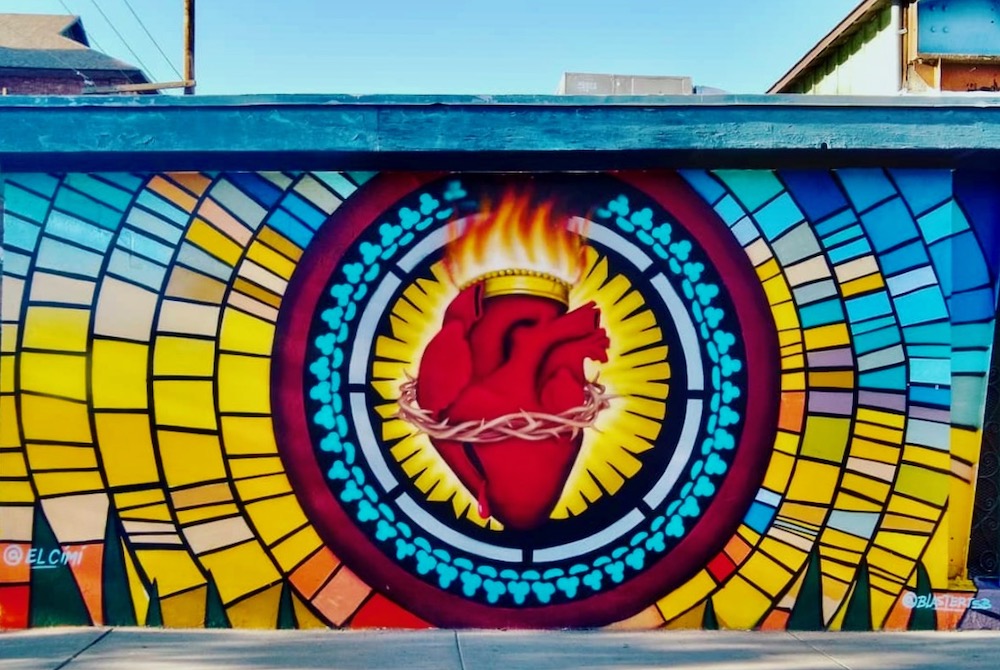
We believe that our Creator is constantly conspiring to love well before we show up. The Sacred Spirit is always two steps ahead of (and behind) us on the journey. "Sagrado Corazón" mural by Jesus "CIMI" Alvarado at Sacred Heart Catholic Church, in El Segundo Barrio, El Paso, Texas, Oct. 13, 2019 (Jeremy V. Cruz)
My own Lenten practice has been sluggish, sapped by the heavy and emotionally-laden demands of this pandemic year. I suspect that I am not alone. Grief, loss, fear and ambiguity about the future elicit a lament that questions what else do we have left to "give up" for Lent?
We do not know one another's hearts. We ought not presume that expressions of seeming despair or lament are self-absolving excuses of mere "spiritual lightweights" who are incapable or unwilling to engage in the practices of the season, like abstinence and fasting. Perhaps these sorrowful expressions are among the most appropriate responses as we journey through our second COVID-19 impacted Lent. To lament is to be present to loss, to live with the absence of what had brought us comfort, joy, even life! Lamentation is a practice of "going without" of "giving something up."
For a time, I may commit to eat low-impact meals rather than eat meat. I may also commit to silence rather than empty words, to lament rather than laughter. Perhaps fasting is choosing to hear María Elisa Pineda, rather than scrolling past her story. Fasting is sitting with her pain, and taking up the cross of her grief as she agonizes over the death of her 11-year-old son Cristian Pavón Pineda, who died of hypothermia while lying beside his 3-year-old brother in the family's freezing mobile home during power outages in Conroe, Texas. Sacred laments are a type of fasting that can transform our world, by transforming our indifference.
None of us makes "God happen" or forces God's hand to act in any particular way, no matter how much we give, how rigorously we fast, or how eloquently we pray. At least that's what we who are Christians claim about the Divine Mystery. We say that the Holy One's grace is abundant and always precedes our gestures. We believe that our Creator is constantly conspiring to love well before we show up. The Sacred Spirit is always two steps ahead of (and behind) us on the journey.
Advertisement
We must not lose sight of the fact that our little practices are for our sake, to force our hands, to draw us nearer to a Love that seeks to be felt, listened for, participated in and infused into every molecule of our motives. That's all — only complete transformation of everything. And this Sacred Heart, which Christians recognize beating throughout our inherited stories about Jesus, will endure with or without us individually dancing to the rhythms of its beat, because fasting never created this beat in the first place.
Two insights have altered my own experience with this practice of fasting. During this time of cascading grief and eco-social disasters, these insights help me view periodic fasting as life-giving, rather than life-sapping, especially as I move through lo cotidiano, my daily living in New York City — as a spouse, un tío, a citizen, un pocho, a professor.
First, my experiences of fasting became more grace-filled once I separated this practice from notions of "self" or "becoming a better person" or "being more religious." Learning from practitioners of Buddhist meditation traditions that focus on cultivating a conscious "no-self" invites me to see the practice of fasting as a way toward de-centering my self when relating to our world.
This learning has drawn me to look for Christian thinkers who have similarly shared wisdom about fasting that is non-self-focused. Catholic children are often introduced to practices like fasting as ways of doing something for the church, or to "be a better Catholic," but this does not exhaust what we know about fasting and is not the fullness of what has been handed down to us. We also fast to connect with Divine Mystery, our Sacred Heart, to participate in building "the life of the world to come," that is, a home on "earth as it is in heaven." We are accounted for in this divine dream for the world, and thus benefit as it is actualized, but we are not the center of this emerging "Great World House," as the Rev. Martin Luther King Jr. described it. This heavenly home-building is not a project to stabilize my ever-evolving and unstable self, like erecting a monument to freeze my idealized ego in time.
Some practices of fasting today are tied to messages of self-improvement and "self-help" urging us to "become better." These tropes are the spiritual weapons of a consumption-fueled economy that always has a sale. This economy only leaves room for two kinds of care: fee-for-service care and "self" care. You and your wallet hold your destiny in your hands. But we don't have to turn the spiritual weapons of consumerism on ourselves, even when we aren't consuming! Fasting need not be one more way to prove our worth, toughness, self-control or resilience in a "self-help" world. Gil Scott-Heron already told y'all:
The revolution will not give your mouth sex appeal
The revolution will not get rid of the nubs
The revolution will not make you look five pounds thinner,
Because the revolution will not be televised, brother
Second, learning from writings and evolving traditions from the past has helped me to pull away from "First World" or "middle class" interpretations that presume that fasting is about "privilege" and "giving up privileges." For most of human history, people have primarily practiced fasting with some limited measure of personal freedom, in contexts of un-freedom and forced deprivation. Thus, from the 58th chapter of the Book of Isaiah to early Buddhist texts, from the Christian Gospels and beyond, religious traditions have produced millennia of human wisdom about fasting that didn't emerge from First World guilt and anxieties. This wisdom can help us both to cultivate greater receptivity toward God's love and to respond more justly to our neighbors, mindful of our differing needs and social positions within evolving eco-social relationships.

Our interpretations of fasting are different when we are mindful of the vast human deprivation that surrounds and affects us. A health care worker at the San Salvatore Hospital in Pesaro, Italy, sits in the hallway at the end of a 12-hour shift of taking care of COVID-19 patients March 19, 2020. (Wikimedia Commons/Alberto Giuliani)
Our interpretations of fasting are different when we are mindful of the vast human deprivation that surrounds and affects us — deprivation from food, from clean water, from safety, from warmth, from familia, from touch, from care, from free movement, from a listening ear, from rest. Fasting — if merely one more deprivation to endure, or a pious retreat from mindfulness about the "ugly world" and all of its suffering — will not put us in touch with our truest human desires and satisfy our deepest needs that extend beyond ourselves. "Giving up privileges" for a few days or weeks doesn't necessarily draw us any closer to the objects, relationships and ways of living that satisfy our interwoven needs and that enable us to "have life, and have it abundantly" (John 10:10).
What if we didn't imagine fasting as fleeing toward a God who moves somewhere far away from our suffering world, and who must be encountered in the distant monasteries of our own self-involved piety? What if we didn't imagine fasting as self-deprivation, or self-imposed redemptive suffering?
What if we imagined fasting as the sweeping away of harmful expectations, including from public spaces? Like a cultural spring-cleaning? Or something like the old African-American tradition of yard sweeping, which cleared spaces for vital communal interaction and has often been ascribed psychological and spiritual significance? What if we imagined fasting as reconnecting? As removing interference? As making room for friends?
What if we fasted from building lethal walls around an imagined "America"? What if we divested our bodies and energy from rituals of militarism and from participation in cop culture? What if the fast that our Creator desires is to untie the cords of systemic whiteness? What if we abstained from colonial masculinity rather than consuming it as daily bread?
What if we fasted from an anxious impulse to build our personal brand? What if we took a break from trying to be more, better, best? What if asceticism is divine rest, a good night's sleep?
Periodic fasting can respond to our shared impoverishment and can help us self-transcend. It can orient us outward — toward kinship, toward recognizing the kin-dom of the Almighty. Periods of abstinence, whatever that means for you, can "clear a path" or "mix things up a bit." Like the visual artist does, fasting can be a way of playing with negative space. It can help us see new things with fresh eyes, or help others see them. It can help us discern how we can vibe with a conspiracy of Love that's already unfolding, with or without us.





